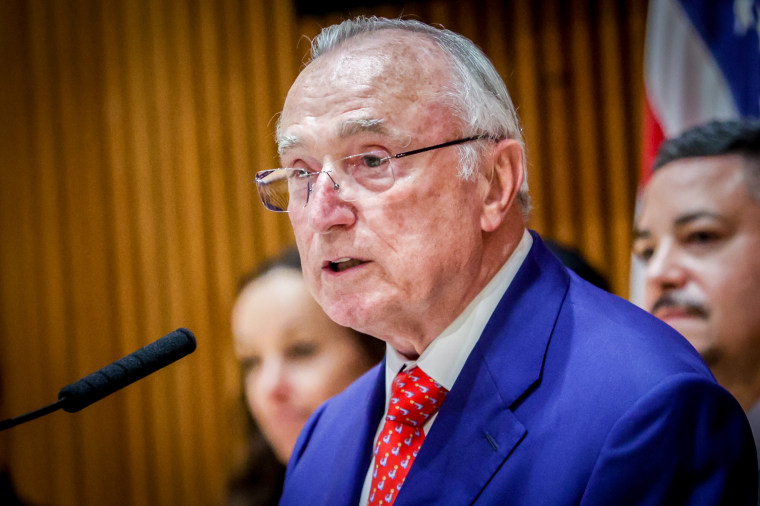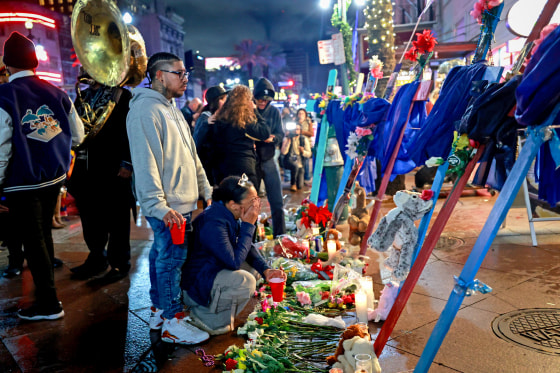New Orleans is bringing on William Bratton, who has been the top cop in Boston, New York and Los Angeles, to counsel the city on its security measures after the deadly Bourbon Street attack, the police chief said Wednesday.
Bratton, 77, a veteran of more than 50 years in law enforcement, will be a tactical expert on assessing security in the city, Police Superintendent Anne Kirkpatrick said Wednesday at a City Council meeting. He will be formally introduced at a news conference Thursday, she said.

Kirkpatrick called Bratton “one of the absolute top experts in this country on terrorism and hard targeting a city” and said he personally answered her call over the weekend to assist in reviewing potential security vulnerabilities.
Bratton started his career in Boston, working his way up to commissioner, before he took over the New York Police Department from 1994 to 1996 and returned for a second stint as commissioner from 2014 to 2016. He led the Los Angeles Police Department from 2002 to 2009. Bratton did not immediately respond to a request for comment.
The appointment was announced at a joint hearing of the City Council’s Criminal Justice and Public Works committees, the first public meeting since the New Year’s Day terrorist attack, in which a man inspired by the Islamic State terrorist group slammed a truck into revelers on Bourbon Street, killing 14 and injuring dozens more.
State Attorney General Liz Murrill ordered the Louisiana Bureau of Investigation on Monday to conduct a “full review” and examine the city’s security plans for New Year’s Eve and the Sugar Bowl as questions remain about how it could have better protected Bourbon Street.
The heavily trafficked thoroughfare did not have vehicle security barriers, known as bollards, at the time of the attack. The barriers that had been in use for several years — and which at times malfunctioned — had been removed for replacement ahead of the city's hosting of the Super Bowl in February. The city also had access to but failed to deploy the 700-pound steel Archer barriers it had previously used to protect crowded streets.
The city has defended its response, saying there were temporary security measures, police vehicles and a large law enforcement presence throughout the French Quarter.
“This man was going to do his best, and if it hadn’t been on Bourbon, he was going to go somewhere else,” Kirkpatrick said last week.
Kirkpatrick, who has been among those under scrutiny, said at the meeting Wednesday that she does not plan to resign.
City Council President Helena Moreno said the council will open an investigation Thursday to look at different contract provisions around the bollards that were recently been removed, as well as what was happening with the replacement of the bollards moving forward.
“I do believe it is important to look back and figure out what gaps were there so that we don’t have those gaps continuing,” she said.
Moreno also questioned the absence of the New Orleans Office of Homeland Security and Emergency Preparedness at the hearing and sought clarity about its role in the security measures leading up to the attack.
“There’s one department that’s missing here that may have the answers,” she said.
She said that in previous administrations, the city’s Department of Homeland Security deployed the different security assets.
“That’s certainly one of the questions that I do think needs to be figured out very soon, as to who is going to be that responsible agency to ensure that all the infrastructure necessary is deployed,” she said.
Asked who manages the city’s security bollards and barriers, Rick Hathaway, the director of the Department of Public Works, said the infrastructure was installed by the Public Works Department at the request of the Department of Homeland Security and others.
Operations and maintenance are managed by Homeland Security or other departments, he said.
The hearing was tense at times as the City Council questioned Kirkpatrick and members of the public criticized the city and the police security response during the attack and raised other grievances.
The absence of the city Department of Homeland Security and Emergency Preparedness and its director, Collin Arnold, was criticized during the hearing’s public comment section.
“Where’s Collin Arnold? He should be right in that seat,” Bruce Reilly, the deputy director of the nonprofit group Voters Organized to Educate, said during the public comment period.
The council said Arnold had been invited to participate.

